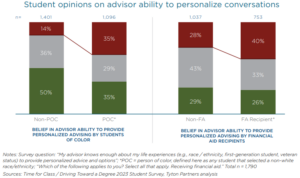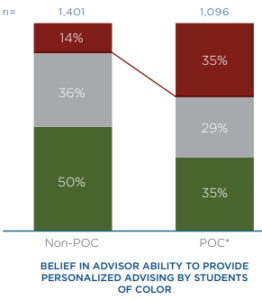The more students are aware of the various support services on campus, such as in academic advising, mental health and financial aid, the more they report positive rates of belonging, according to a new report from Tyton Partners.
The 2023 edition of “Listening to Learners” found that students who interacted with an average of three student support services were more likely to report that they “strongly agree” with the fact that they feel like they belong at school. Among students who “strongly disagreed,” the average number of services they interacted with was 2.3.
Similarly, students who feel confident speaking about their mental health to advisers and who feel they have the resources to help pay for college correlated with a 76% and 42% uptick in the sense of belonging on campus.
The studies pointed to a range of resources that illustrate how students’ sense of belonging contributes to increased engagement, academic performance, and personal growth and well-being.

The report collected data from over 2,000 students and 4,000 instructors, advisors administrators across nearly 1,500 institutions.
As positive as this correlation looks between students utilizing school resources and their sense of belonging, several roadblocks impeded students from taking advantage of these services.
More from UB: Your student body has fewer Pell Grant students than 10 years ago
Student awareness and utilization of support services is poor
Despite more than 90% of institutions reportedly offering services in academic support and career and financial aid advising, roughly 50% of students are unaware of these services. Across the 14 support services Tyton Partners surveyed students and institutions on, there was a 38% discrepancy between the institutions that offered the services and students’ awareness and utilization of them. The largest discrepancies (40%) were for accessibility services, library and research assistance and student health clinics.
Simply informing students of such services may not be enough. While first-generation students reported being more aware of them, they were less likely to utilize them compared to continuing-generation peers.
“Messaging to this group will require encouragement beyond simply informing students of available resources and needs to focus on normalizing seeking help,” wrote the authors.
Lack of diversity among advisers is hurting minority students’ sense of belonging
While 70% of students reportedly value representative diversity among advisors, only 30% of institutions report approaching the concern with a systematic approach. This possible disproportion in student and adviser diversity may lead to why people of color (POC) feel less likely to agree that they can receive personalized advising from their resources.








